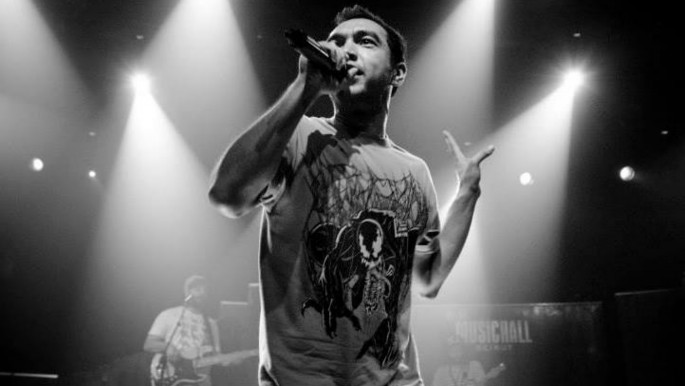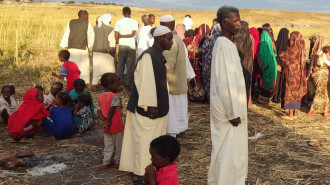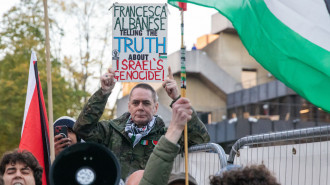Music for the marginalised: Chyno on identity and radicalism
Born to a Syrian father and Filipino mother, Nasser Shorbaji's inheritance of Asian features not only leant to his nickname "Chyno" [pronounced Chino] but saw the rapper grow up in a world beset by ethnic stereotypes and racism.
Now having successfully emerged from the lonely land of "no nationality" as a successful rapper, Chyno speaks to The New Arab about racism in the Arab world and his quest to reach out to the radicals of his homelands.
"Although my father is Syrian, I don't look Arab enough for people in the Middle East and I don't look Filipino among people in the Philippines - so I have had 30 years of feeling disenfranchised and not being at home," Chyno tells The New Arab.
"I get stopped by police in Lebanon because of the way I look," Chyno adds.
Racism and exclusion sit centre stage in the artist's burgeoning rap career and form the bedrock upon which he seeks to understand radical Islamists.
"It is very easy to reflect on racism because it has happened to me. I know that we live in a very turbulent political atmosphere, so the issue cannot be disconnected from everything else that is going on around us."
Born in the Philippines, raised in Manila, Damascus and Saudi Arabia, and having lived in Barcelona and Beirut, Chyno says music was the medium through which he began to navigate his exclusion from a world dominated by race.
"I felt that I needed to make music. It became a necessity; an urge. Through music, I was searching for a sense of individuality because I could not fit in."
 |
| Chyno is also a member of the hip-hop outfit FareeQ El Atrash [Photo by Myriam Boulous] |
A struggle to belong
For Chyno - also a member of the hip-hop outfit FareeQ El Atrash - his 2015 debut solo-album "Making Music to Feel at Home" marked both a milestone in his music career as well as a part of his unique journey in forging a special identity in the Arab world.
Through complex rhymes filled with alliteration and betraying heartfelt emotion, Chyno's music above all sought to convey his struggle with being unable to belong.
The tracks on the album - including "Fight or Flight" - were produced to the backdrop of the Syrian civil war and testified to the strain of exile and seperation afflicting Arabs across the region.
"The album tackled the issue of being away from Syria," Chyno says. Yet, the rapper adds, the multitude of woes afflicting the region leave no shortage of topics into which musicians may delve.
"The sad thing about hip-hop in the Middle East is that there is an abundance of material to think about and address, because of all that is happening on the socio-political front."
From singing about radicals to singing to radicals
After leaving Syria, Chyno settled in Beirut not just because of its proximity to his homeland but for the freedom there to produce songs addressing political concerns.
| Lyrics from O.P.P |
|
"To symbolise freedom, I'll dive into hell |
"I was grounded in Beirut because of the freedom of speech, as it is one of the few countries in the region where I feel we can talk about absolutely anything without the fear of being apprehended," Chyno says.
However one of his more daring singles, released in 2013, received a mixed and even hostile reception.
In a Lebanon still reeling from an unprecedented spate of suicide bombings, Chyno's single OPP [Other People's Property] sought to delve into the mind of a suicide-bomber driven to end his life and that of countless others by politics and economic exploitation.
The inflammatory music video which accompanied the track saw Chyno play the role of a suicide bomber.
"OPP is a first-person narration of a suicide bomber. I wanted to humanise the situation. It is an extreme situation and nothing I condone, but I wanted to reflect the socio-political pressure that could lead one to become a suicide bomber," he says.
The song received a mixed reception in Lebanon and became a mark of notoriety for the artist.
"When I released it in 2013, the radios refused to play it. Even when I was interviewed by some radio stations, they would ask me not to talk about 'the song with the suicide bomber'."
International recognition for the song followed soon after.
In November 2013, OPP's video was ranked alongside tracks by Eminem, Leonard Cohen and The Arctic Monkeys as a top song in Rolling Stone Middle East magazine.
In the years that have followed Chyno's emergence as an internationally recognised solo artist, the rapper has had his sights fixed on issues of marginalisation, radicalism and the role music can play in an increasingly unstable world.
Chyno's latest project, Noisey Lebanon, is a web series that examines how hip-hop can help deter young people in the region from joining militant groups such as the Islamic State group.
"This project is heavily research based, as it involves interviewing people who have been linked to terrorist groups," Chyno says.
"As part of the project, we interviewed renowned psychologists and other experts who work with extremists, and incorporate that information into the lyrics."
The rapper argues a key to success for reaching out to potential extremists is an understanding of the radicalising affects of being marginalised and the seductive dreams of liberty promised by militant groups.
"It is meant to tackle something as sensitive as IS, but at the same time not marginalise the people who are recruited because they were forgotten by their governments and were seeking an alternative source of liberty."
Chyno says Middle Eastern hip-hop stands distinct because of the political awareness of its performers.
Central to the whole project of Middle Eastern Arab rap, he says, is the awakening of critical talent particularly in younger generations.
"We want to challenge the way of thinking right now in our part of the world. But the music we want to do is not informative, because the information is out there. We just want to package it in a way that makes people think."
Listen to the album created for "Noisey Lebanon" and more from Chyno here. Follow Chyno on Twitter: @ChynoVation
Sarah Khalil is a journalist with The New Arab. You can follow her on Twitter: @skhalil1984





 Follow the Middle East's top stories in English at The New Arab on Google News
Follow the Middle East's top stories in English at The New Arab on Google News


